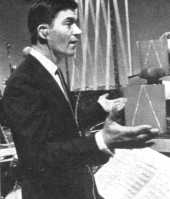JACK PARNELL
All–electric big band

Links
Jack,
Buddy and Maynard
What the bands were doing
Parnell programmes
Jack Parnell on Ron's Pages
The Great Big Bands
Interviews
Looking
back— and forward
All– electric big band
CD Review
Big Band Swing
The appeal of our big band TV shows may well indicate that a lot of people have got a little bit fed up with all the heavily amplified musicóit is a bit strong at times.
And a big band still makes enough woof, but without that electric feeling about it. Which I love, incidentally; when itís controlled, you know, like Herbie Hancock and things like that, I think itís a lovely sound. Iíve heard some marvellous thingsógreat time, good musicófrom an awful lot of the rock groups. Iím certainly not opposed to electrification in itself; Iím opposed to when it sort of takes over, and it just goes over the border. But when itís clear and crystal and swinging, itís just fine.
As for importing some of that into a big band contextóIím very seriously looking into it. Because I think that what would be very excitingóif there was a desk, and the thing was put through microphones, so that everybody had them; they were on everything. Trying to recreate the sound of a band on a record, I mean, might be tremendously interesting, because you could then play very quietóand all those inner harmonies that you sometimes miss could come through. The actual music content could improve, with that.
It has been said that the big band should be more orchestral. Well, the writing does that, and the kind of amplification Iím talking about would be a way of bringing that off. Even so, though, it canít go too far away from swinging. But then good orchestral music swings, when itís really good. Thatís what itís all about, really. What itís also all about is public reaction.
Itís been a big kick for me lately to work to an audience. Actually, though, Iíve got so used to not having one, I find it a bit difficult. You know: ďOh, my goodnessópeople.Ē I canít get so introverted about music. Then, I donít knowóyouíve got to get into the music. But I remember, when I was a fullĖtime drummer, I was conscious of being a bit of a showmanóIíve got right out of that. In front of the band, I can turn round and talk to people, but on the drums, that business of putting it overóIím a bit lost with all that now.
I certainly do think television should do more, as far as music is concerned. But on that score, itís in competition with records, isnít it? And the sound quality canít get up to that level. I think thatís one of the reasons why there isnít more of it used on televisionóits actual sound from the speaker doesnít knock people out. Although, on the ,other hand, when you hear something beautifully recordedólike some of the background music on these American whodunnitsóitís thrilling. Sounds terrific.
So that puts that one out. I donít know; I havenít got an answer to it. Perhaps itís because itís expensive. But still, itís no more expensive having musicians doing a band show than it is having them accompanying artists. It must be just the proof, that in some way or other, comedy and drama are more popular on television than music is. As I say, records are what youíre really up against. Incidentally, weíve made a record ,of some of the material from the TV show, and thatís in the shops now.
Without doubt, music is very well represented on records; most of the stuff thatís good is getting recorded. Tons of records are being made, and I think the new people are able to get a hearing. Iím always hearing things. Hardly a week goes by when I donít get knocked out with somebody I havenít heard before, on records. In jazz, I do think advances are being madeónot enormous ones, any more than they were at any time in the pastóOscar Peterson might not be playing anything particularly newóbut Keith Jarrett is, and people like that. At the moment, jazz is really a small group medium; big band jazz is not the most extended part of the repertoire.
It remains to be seen, what direction itíll go in. As for the free form ideaópart of that is good, but jazz has still got to swing, for me. If itís a bit too freaky, I donít care for it; I like a bit of a footĖtapping feel, you know. Of the younger musicians, the ones you like are the ones whoíve got that feelóyou start picking them out.
Because thatís not an oldĖfashioned feel; itís as much of today as ever it was. Thatís the same thing, that keeps going through.
Copyright © 1976, Les Tomkins. All Rights Reserved